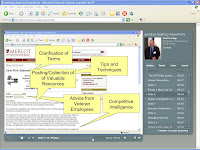My favorites are:
The Hero Can Immediately Use Any UITo that I say...yeah but that's what we try to teach our students to do.
Break into a company -- possibly in a foreign country or on an alien planet -- and step up to the computer. How long does it take you to figure out the UI and use the new applications for the first time? Less than a minute if you're a movie star.
The fact that all user interfaces are walk-up-and-use is probably the single most unrealistic aspect of how movies depict computers. In reality, we know all too well that even the smartest users have plenty of problems using even the best designs, let alone the degraded usability typically found in in-house MIS systems or industrial control rooms.
And, hey Will Smith did crash the alien ship in Independance Day...he had some trouble...like moving from Director to Flash.
The 3D UIBut it just looks so damn cool!
In Minority Report, the characters operate a complex information space by gesturing wildly in the space in front of their screens... Gestures do have their place, but not as the primary user interface for office systems

"This is Unix, It's Easy"Having started my career using a Sun Solaris Operating system, I struggled through many chmod, lprm and kill commands...I was a lot older than 12 and still had trouble. That is until one of the techies told me to do a rm*.* at the root directory...that fixed everything:) It even helped me to get a new job.
In the film Jurassic Park, a 12-year-old girl has to use the park's security system to keep everyone from being eaten by dinosaurs. She walks up to the control terminal and utters the immortal words, "This is a Unix system. I know this." And proceeds to (temporarily) save the day.
The entire list is great. Check it out.
__
Recommended Games and Gadgets
Recommended Books
Content Guide

























